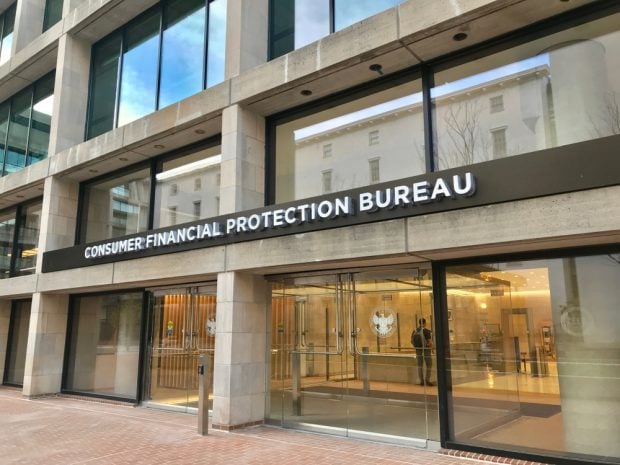 CFPB headquarters in Washington, D.C. Source/Shutterstock
CFPB headquarters in Washington, D.C. Source/Shutterstock
Just like the NFL likes to kick off its season with its most dramatic rivalries, the Supreme Court likes to start terms with some of its most dramatic cases. So it is not surprising that Cmty. Fin. Servs. Ass'n of Am. v. Consumer Fin. Prot. Bureau was argued on the first Tuesday in October. It's a real doozy.
In case you have been out of the country and cut off from the internet for the last year, this is the case in which the Court of Appeals for the Fifth Circuit ruled that the CFPB acted consistent with its Unfair and Deceptive Acts and Practices (UDAAP) powers when it promulgated regulations curtailing payday loans but then ruled that the mechanism devised by Congress to fund the bureau was unconstitutional, implicitly finding that all the actions ever taken by the CFPB were therefore invalid.
Recommended For You
On occasion there is a natural desire to want to "stick it to the Man," especially when the Man is responsible for imposing 10 years' worth of consumer protection mandates on a credit union industry that didn't feel it needed to be regulated into helping the consumer in the first place. But the reality is that the less the Court does to undermine the CFPB and its regulations, the better off the industry. In fact, a dramatic ruling will result in more legal and compliance risks for credit unions and a regulatory framework that provides little more flexibility than what the industry has today.
Don't get me wrong. If I made my living as a law professor instead of providing legal and compliance advice to credit unions, I would be taking a different view of this case. Congress never should have delegated so much authority to one unelected regulator. Almost every consumer in the country and thousands of businesses are impacted not only by the regulations the CFPB promulgates but by the actions it takes pursuant to its overly broad authority to define and prosecute Unfair and Deceptive Acts and Practices. But by upholding an expansive view of the bureau's UDAAP authority only to invalidate the bureau based on the way it is funded, the Fifth Circuit used a chainsaw when a scalpel was needed.
Anyone who offers mortgages to their members should brace themselves. Virtually every stage in the lifecycle of a mortgage loan, from the point at which a member is deemed to have requested a Loan Estimate to the steps that must be taken when a member is struggling to make her payments and facing foreclosure is addressed in regulations that have been promulgated by the CFPB. Now imagine if all these regulations cease to exist. Does this mean that a member is no longer entitled to a Closing Disclosure that was designed pursuant to CFPB regulations? Does it mean that there is no longer a federal definition of what constitutes a Qualified Mortgage? No one really knows the answer to any of these questions, which is why the Mortgage Bankers Association warned the Court in its brief that "[t]he litigation and widespread uncertainty that would likely result from a decision that suddenly called all the CFPB's rules into question would prove devastating to the mortgage market."
And as depository financial institutions, the ruling's impact will go far beyond the mortgage lending industry. Any enforcement action or guidance issued by the bureau would cease to have legal effect. Your credit union would have to decide when to modify its operational practices against the backdrop of an almost unprecedented legal miasma for which much legal advice would be of limited value. Think of the number of credit unions that have decided to forego overdraft and other fees not because they thought they were treating their members unfairly but because the CFPB decided that such fees were "unfair."
It might be tempting to convince yourself that uncertainty is a price worth paying to do away with the bureau. But the legal equivalent of closing your eyes and clicking your heels is not going to turn the CFPB into a bad dream. If the bureau closed tomorrow, every federal agency and many state legislatures and regulators would rush to fill the void. Politics, like nature, abhors a vacuum. Enhanced disclosure requirements might have different names, but credit unions would still have to comply with them, "qualified mortgages," and the ever-present threat of class action litigation. But, without the CFPB, each one of these obligations will vary by state, regulator and courtroom. The NCUA for example has already expressed concern about consumer compliance issues and would most likely impose tougher examination requirements on credit unions with $10 billion or more in assets no longer subject to examination by the CFPB.
Another scenario, supported by NAFCU and CUNA in their joint amicus brief, is for the Court to invalidate the bureau's funding mechanism but stay the ruling to give Congress time to craft a legislative fix. Unfortunately, the likelihood of Congress being able to enact major legislation in the months leading up to congressional and Presidential elections is about as likely as Fox News endorsing President Biden's reelection. Let's say I'm being too pessimistic, and Congress can resurrect the bureau. Even this best-case scenario would most likely mean a burst of new regulations further driving up compliance costs.
At the end of the day the bureau or its legacy is going to continue to impact your credit union no matter what the Court rules. Consumers and financial institutions alike would be better off working with the regulations and laws they have been working with for more than a decade and have spent billions of dollars to comply with rather than scrambling to comply with a pandora's box of new interpretations and legislation.
 Henry Meier, Esq.
Henry Meier, Esq. Henry Meier is the former General Counsel of the New York Credit Union Association, where he authored the popular New York State of Mind blog. He now provides legal advice to credit unions on a broad range of legal, regulatory and legislative issues. He can be reached at (518) 223-5126 or via email at [email protected].
© Touchpoint Markets, All Rights Reserved. Request academic re-use from www.copyright.com. All other uses, submit a request to [email protected]. For more inforrmation visit Asset & Logo Licensing.






